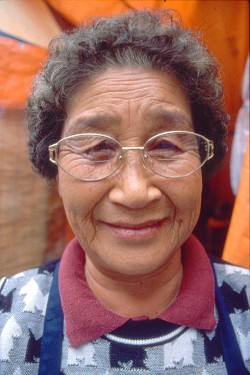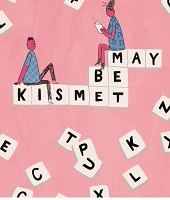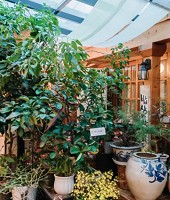
Koreabridge: “We’re Accustomed To This”
by Lavinia Spalding (google+)Melissa and I are awakened by three generations of Koreans noisily constructing a space age-looking tent just centimeters from our toes. It's your typical purple dome-tent, but designed for use at the beach, with big open sidings. As the adults go to work, yelling instructions at each other, their children race around in circles, shrieking. Melissa looks at me and groans, rolls her eyes. I lift my head and cast scathing glances at the children, intending to turn them to stone with my glare and in this way shut them up. It doesn't work.
After two years in Pusan, Melissa and I should know better than to expect a quiet Sunday at the beach. Nevertheless, we're American and some things are ingrained - we can't help but feel annoyed by intrusions.
The amount of noise pollution one family can produce at the beach when you're trying to sleep is remarkable. Still, it's not quite as impressive as that of a single man carrying a large megaphone. I sit up on my elbows to watch him as he marches resolutely toward us, and though he isn't carrying anything else in his hands, I suspect he's a salesman. When he pauses in front of us, between our feet and the tent project, my suspicion is confirmed. His megaphone turns bilingual.
"Believe in Jesus and you will be saved, you and your household," he instructs twice, speaking directly to our bikini-covered chests, before moving down the beach. Out of a good fifty thousand people on Haeundae Beach today, Melissa and I are unquestionably exposing the most skin. It's clear we could use some salvation.
The tent is finally upright, conveniently positioned between us and what was moments ago our unobstructed view of the sea. One grandmother and four middle-aged women - ajumas, they're called in Korea - huddle inside it now, each claiming for herself one tiny square of precious shade. None of them wears a bathing suit. In fact, each is dressed for a cool autumn day, in long-sleeved shirts and pants. It's late July, in the upper nineties today. The ajumas chat and laugh in high-pitched, sing-song voices, occasionally sneaking peaks at us over their shoulders. It's too hot to be in a conciliatory mood today. Plus, I'm hung over, I have a huge blister on my right heel from dancing last night, and my chin is breaking out. I'm almost thirty, too old for a pimply chin. So, I stare right back.
The men in the family have gone off to frolic, also fully clothed, in the water. Outside the tent, a young boy of about ten whines half-heartedly as his mother covers him in sunscreen, polishing his skin as if he were the dining room table. He squirms and protests, but the bulk of his attention is directed toward us. He gapes at our skin, so pale, so freckled, and so much of it, right here in front of him. He can't take his eyes off us, nor can he shut his mouth, which has dropped open in fascination.
We're accustomed to this attention, more or less. About an hour ago, a young man approached and thrust a camera in Melissa's face.
"Excuse me. Picture," he demanded.

A spectacle even with clothes on, we're the token Westerners in our neighborhood, observed at all times and from every angle.
Yes, we're accustomed to this. A spectacle even with clothes on, we're the token Westerners in our neighborhood, observed at all times and from every angle. On the narrow, winding street that leads to our house, children throw their heads out of bus windows to scream blood-curdling hellos at us. Teenagers loitering outside video arcades in their blue school uniforms stop talking when we pass and mechanically recite, "Welcome to Korea."
We are foreigners - essentially, celebrities - and as such, we've forfeited our privacy, our secrets. Everyone knows us. The most that we know about Mr. Shim, the sweet old laundry man on the corner, is that he's Mr. Shim, the sweet old laundry man on the corner. Mr. Shim, however, knows when we've been smoking, when we've sweat profusely or spilled food on ourselves, when we've menstruated. Mr. Park, the grocer across the street with the gold tooth and the fishing hat, couldn't remember our names if his life were at stake. But he could tell you exactly how much beer and cheap soju we drink during the average weekend. Mrs. Lee, our landlady, has discovered men leaving in the morning, and once telephoned the director of our private English institute to complain about it. I believe she keeps better track of the men in our lives than we do. Our Tae Kwon Do instructor has seen us listless, lying on the floor mat groaning like invalids. He's also witnessed us ferocious, begging for something to punch or kick. He knows our temperament, our strength, better than we do. The video store ajuma keeps a record in her mind of precisely how many times we've rented Pretty Woman. She shows us on her fingers each time we bring it guiltily to the counter.
We live in fear that these people talk to each other. That collectively, they've got the goods on us. No matter how long we live here, we will remain oddities, sources of unending curiosity. In bars and on elevators, we're poked and prodded like lab specimens. We've gotten felt up in buses and subways, and had our arm hair combed by inquisitive old ladies. We've been compared to monkeys, and told that we smell like butter.
In our classes, as well, we're awarded special attention and denied the basic right to privacy. Our students often take no interest in grammar or vocabulary. Instead, they're there to find out whether or not we've tried marijuana, or ever had sex. They want to know how many guns we own, if we've seen Leonardo DiCaprio in person, if we can use chopsticks, and if we have a swimming pool in our backyard at home.
And while they don't possess the intimate knowledge of our vices that the neighborhood merchants do, it's undoubtedly our students who know us best in this city. This is because we're no longer an enigma to them. They see us five days a week and, unlike our voyeuristic neighbors, are concerned now with more than the specific tangibles of what we drink, smoke and bring home at night. They want to know instead how we feel about drinking, why we smoke, and what type of man we'd like to bring home the rest of our nights. From this information they've come to know us, and not merely the habits for which, in our neighborhood each day, we're identified.
Often, the difference between knowing and understanding someone is acquiring the ability to interpret not their actions, but their reactions. Our students have learned to recognize what angers us, hurts our feelings, touches us, makes us laugh. My seven-year old student, who has chosen for himself the nickname "Batman," knows that regardless of how stern my admonitions may sound, it's physically impossible for me to keep a straight face when he asks permission to use the restroom by standing up beside his desk, holding his fist in front of his zipper, waving it around and saying,
"Teacher, pssssss ok?"
There's a proverb in Korea, "Do not even step on a teacher's shadow." Another says, "God, teacher, father - one body." In Korea, respect for one's educators is a value instilled at an early age. It's this I think of when I enter a classroom and see that a young student has located a dry-erase marker and written "Puck You" in large letters on the white board. It's at this moment that I realize, with a sharp pain in my heart, that no matter how much grammar and vocabulary I teach my students, or how often we practice the correct pronunciations of P and F, often I'm not here as a teacher, a respected educator. I'm here to be an American.
Because of this, I've realized the value of actually doing what I'm paid to do - teaching my students, rather than merely entertaining them. While it may seem like an uncomplicated notion, too many American teachers living in Korea describe themselves as game show hosts. What this says to me is that they've accepted the easy way out, and worse, that they're perpetuating the myth that Americans know only one way to teach - by playing Hangman and Bingo. While I don't deny it's essential to have fun in the classroom, the fact is that we're here to teach English - therefore, we should insist that the students allow us to do so.
And it is only when we have, that they begin to stop us outside the classroom, bow their heads low and thank us, or give us big glass jars filled with a hundred multi-colored origami cranes that they've folded themselves, or bring us exquisite, traditional slippers that their grandmother sewed for us, or take interest in us as teachers, or stop jumping up and down on our American shadows.
On the beach, our neighbors seem to have settled nicely into their new surroundings. The men are burying each other in the sand, while the women prepare a late afternoon lunch inside the tent. Nearby, the children systematically build and demolish sand castles. None of them has gotten any quieter, and Melissa and I are resigned by this point to staying awake while we sunbathe. We could find a different spot down the beach, but we're too lazy to move.
The day has only gotten hotter, and the children have evidently played in the sun too long - they're becoming increasingly restless. The oldest one, the same boy who gawked at us earlier, has been torturing his younger siblings for the past few hours - pinching them and pulling down their swimming trunks. He's the sort of kid you can take one look at and know that in school, he hurls erasers at other kid's heads. While it's unfortunate that he's our beach neighbor for the day, I comfort myself with the fact that at least he's not my student. Melissa has already informed me four times today that she's never having children.
My eyes are closed, so I don't notice him approaching me, on what is surely the Korean version of a triple dog dare. All of a sudden, my face and body are covered with a shower of sand. I sit up, wiping my eyes and mouth, and see him run screeching back to his brothers and sisters.
"Hey!" I yell, pointing at him, "Hajima!"
All I've said is cut it out. What I should say is that I'd like to stuff some sand down his stupid, screaming throat.
"That little shit," I say to Melissa.
"I'm never having children," she replies, picking sand off her stomach.
We've had enough. We begin to pack up our stuff, shooting indignant looks at the entire family. While we're shaking our sarongs in their direction, one of the ajumas from the tent huddle seizes the boy by the arm and drags him to us. She speaks nervously, her fingernails dug so deeply into his arm that he'll have a row of parentheses in his skin for hours.
"I am sorry. My son, bad," she says.
Then she forces him to apologize, shaking him by the forearm to make the words spill out. His eyes are lowered, his face terrified. He mumbles an apology in Korean and she orders him to speak English. When he's done so, she stops shaking him, but he still trembles.
Now I feel bad. I tell her it's ok, no problem. I pretend my venomous looks were directed at someone standing just behind their tent.
She asks us, using a mixture of Korean, broken English and body language, to please join them in their tent for lunch. I look at Melissa, who shrugs with her eyes.
"Itsay upay ootay ouyay," she says in Pig Latin, a language which, by necessity, we've mastered.
I tell the ajuma no, thanks anyway. She asks again, please, and I look at the boy. His eyes are brimming with tears.
The tent is cool, and sizably larger than it had appeared from the outside. Melissa and I enter a bit bashfully, hunched low under the canopy, and our heads bob up and down like yo-yos as we bow to greet each ajuma. We're immediately ushered to the best slice of shade, right in the center, and handed two miniature yogurt drinks in plastic bottles. The ajumas all shift positions, rearranging themselves to accommodate our entrance into their world, and Melissa and I fold our legs beneath us, attempting to take up as little space as possible, and still manage a modicum of comfort. When everyone is settled, there's a short, semi-uncomfortable silence, then they all speak at once, the ajumas stumbling over the English they haven't studied since high school.
"Marry?" one of them asks us.
"Anyo, uri neun kyulhone anhessuyo," I answer - We're single. After another pause, the women simultaneously explode in laughter, delighted and surprised that we speak their language.
When we say goodbye to the family two hours later, we're satiated from kimchi, kimbap, and various kinds of fruit, and we have a bag of grapes to take home. We've learned some new Korean words and been taught to peel an apple in one long strip without breaking it, a skill we've both dreamed of mastering since Meg Ryan did it in Sleepless in Seattle. We, in turn, have shown the children how to dribble watery sand over the turrets and spires in their castles to create a gothic effect, before helping to demolish them. The ajumas all know that we can use chopsticks, that we're still searching for our Mr. Rights, and that we're both from Arizona originally, where yes, Melissa has a pool in her backyard, but no, I do not. We have an appointment to accompany the whole family to Dongnae next Sunday, where we'll picnic by a creek and tour the largest temple in the Pusan area. And I have a new private job, teaching English to the boy at their home, twice a week. Their chauffeur will pick me up and drop me off each time.
We're accustomed to this attention, more or less. And I doubt we'll ever get used to it.
-
The New York Times, Modern Love: “Goodbye, My Fantasy Man”
-
AFAR Magazine: “Playing by Heart” (Winner of a Gold Lowell Thomas Award)
-
Longreads: “The Cabin”
-
River Teeth: A lot of Tomorrows
-
Going: New Orleans, The Southern US City Where Jazz Was Born
-
Parents: I Grew Up in a Haunted House—Here’s What I Tell My Child About Ghosts
AFAR: Seoul Food
Off Assignment, Letter to a Stranger: “To the Shopkeeper in Fez”
The Bold Italic: “Working Three Jobs Nearly Killed Me”
AirBnB Magazine: “So I Slept in a ...Cave”
AAA Westways Magazine: “Korean Encore”
AFAR.com: “Everything You Need to Know About Jazz Fest”
AFAR.com: “Get Beyond the Beads: The 101 on Mardi Gras Throws”
AFAR.com: “The Art of Eating Crawfish in New Orleans”
AFAR.com: “Find New Orleans’s Soul at These 6 Mini-Museums”
Ms. Magazine: “Politics is on the Menu at Hell’s Backbone Grill”
AirBnB Magazine: “New Orleans for the Celebratory”
Off Assignment, Letter to a Stranger: “To the one who was supposed to get away”
-
The New York Times, Modern Love: “Goodbye, My Fantasy Man”
I wasn’t willing to settle for less than kismet. But chasing a romantic illusion nearly kept me from finding love. -- The night I agreed to try online dating, I told my roommate Meghan I hoped I wouldn’t meet anyone because that wasn’t the kind of story . . .
-
River Teeth: A lot of Tomorrows
We are at the dinner table when my young son asks, “The day after a lot of tomorrows, will we build a treehouse?” I want to scoop him in my arms, this boy so eager and fresh, so tall his forehead meets my shoulder. If I could, I would lift his body above . . .
-
AFAR: Seoul Food
I still clearly remember my first meal in South Korea. I had just arrived in the country, fresh out of college and ready to begin a job teaching English. My new boss had whisked me from the airport to a barbecue restaurant, where I’d watched in panic as . . .
-
The New R&R
. . .



























